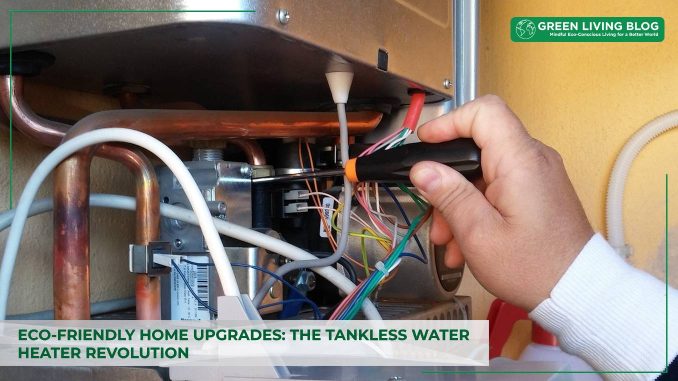
As the world becomes more environmentally conscious, homeowners are increasingly seeking sustainable and efficient home upgrades.
One of the most impactful and eco-friendly home upgrades is the installation of a tankless water heater.
This innovative technology not only reduces energy consumption but also provides numerous benefits for both the environment and homeowners.
In this article, we’ll explore the tankless water heater revolution, detailing its advantages, how it works, and why it’s a smart investment for eco-friendly living.
What are Tankless Water Heaters?

A tankless water heater, also known as an on-demand or instantaneous water heater, is a modern alternative to traditional storage tank water heaters. Unlike conventional units that store a large volume of water and keep it heated continuously, tankless water heaters heat water directly as it flows through the unit. This means hot water is available on demand, without the need for a storage tank.
How Do Tankless Water Heaters Work?
Tankless water heaters operate using high-powered burners or electric elements to heat water as it passes through the unit. When a hot water tap is turned on, cold-water travels through a pipe into the unit, where it is rapidly heated to the desired temperature. This process ensures a continuous supply of hot water, as long as the demand does not exceed the unit’s capacity.
Advantages of Tankless Water Heaters
One of the primary benefits of tankless water heaters is their energy efficiency. Another tankless water heater benefit is the ability of the tankless water heater to continuously heat and reheat stored water to maintain a set temperature. In contrast, tankless units only consume energy when hot water is needed, eliminating the standby heat loss associated with storage tanks.
According to a report by the U.S. Department of Energy, tankless water heaters can be 24% to 34% more energy-efficient than conventional water heaters for households that use 41 gallons or less of hot water daily.
1. Continuous Hot Water Supply
Traditional water heaters are limited by the capacity of their storage tanks, which can result in running out of hot water during peak usage times. Tankless water heaters, on the other hand, provide a continuous supply of hot water on demand. This means that multiple fixtures, such as showers and faucets, can be used simultaneously without worrying about depleting the hot water supply.
2. Space-Saving Design
Another advantage of tankless water heaters is their compact size and versatile installation options. Traditional water heaters with large storage tanks require significant space, often taking up valuable room in basements, utility closets, or garages. Tankless units, however, are much smaller and can be installed in a variety of locations, including on walls or in small closets. This space-saving design allows homeowners to utilize their living space more efficiently.
3. Environmental Benefits
Tankless water heaters contribute to a reduced carbon footprint by decreasing energy consumption and greenhouse gas emissions. The efficiency of these units means that less fuel is burned to heat water, resulting in lower carbon dioxide emissions. For environmentally conscious homeowners, this makes tankless water heaters an attractive option for reducing their home’s impact on the environment.
4. Longer Lifespan and Less Waste
Tankless water heaters typically have a longer lifespan than traditional storage tank units. While conventional water heaters may last around 10-15 years, tankless units can often function effectively for 20 years or more with proper maintenance. This longevity means fewer replacements and less waste, contributing to a more sustainable and eco-friendlier lifestyle.
Considerations When Choosing a Tankless Water Heater

Sizing and Capacity
When selecting a tankless water heater, it’s essential to consider the hot water needs of your household. Tankless units are rated by their flow rate, measured in gallons per minute (GPM). To ensure an adequate hot water supply, you need to choose a unit with a flow rate that meets or exceeds your household’s peak demand. This involves calculating the combined flow rates of fixtures that may be used simultaneously, such as showers, faucets, and appliances.
● Professional Assessment
Given the technical considerations involved in selecting the right tankless water heater, it’s advisable to seek a professional assessment. An experienced plumber or HVAC technician can evaluate your home’s hot water needs, plumbing system, and installation requirements to recommend the best unit for your situation.
Installation and Maintenance
Installing a tankless water heater requires expertise and knowledge of local building codes and regulations. Professional installation ensures that the unit is correctly sized, safely connected to the gas or electrical supply, and properly vented if necessary. A certified installer can also help you navigate any permits or inspections required by local authorities.
● Regular Maintenance
To maximize the lifespan and performance of your tankless water heater, regular maintenance is essential. This includes descaling the unit to remove mineral buildup, inspecting and cleaning filters, and checking for any potential issues. Many manufacturers recommend annual maintenance to keep the unit running efficiently and to prevent costly repairs down the line.
Last Note
The tankless water heater revolution represents a significant step forward in the quest for eco-friendly home upgrades. By offering increased energy efficiency, continuous hot water supply, space-saving design, and environmental benefits, tankless water heaters provide a compelling alternative to traditional storage tank units. While the initial investment may be higher, the long-term savings and sustainability make it a smart choice for homeowners committed to reducing their environmental impact and embracing a more efficient lifestyle.
![]()
Author Profile

- Eco Warrior by day, Eco Blogger by night trying to get the eco balance right.
Latest entries
 EnvironmentJuly 9, 2025Does Double Glazing Help Increase Your EPC Rating?
EnvironmentJuly 9, 2025Does Double Glazing Help Increase Your EPC Rating? Green LivingJune 30, 2025Herbal Tea for Insomnia: Your Guide to Natural, Sustainable Sleep Solutions
Green LivingJune 30, 2025Herbal Tea for Insomnia: Your Guide to Natural, Sustainable Sleep Solutions EnvironmentJune 24, 2025What are the most energy-efficient Home Upgrades in 2025?
EnvironmentJune 24, 2025What are the most energy-efficient Home Upgrades in 2025? EnvironmentJune 23, 2025Eco-Friendly Paper Straws: A Small Switch That Speaks Volumes for your Brand
EnvironmentJune 23, 2025Eco-Friendly Paper Straws: A Small Switch That Speaks Volumes for your Brand





Leave a Reply
You must be logged in to post a comment.